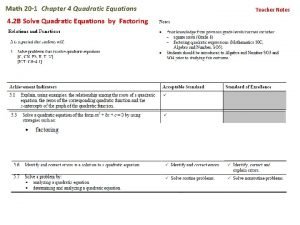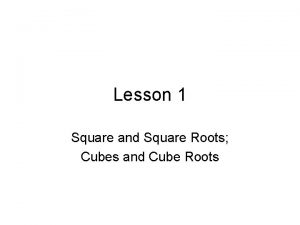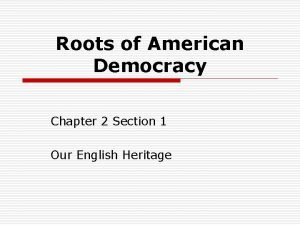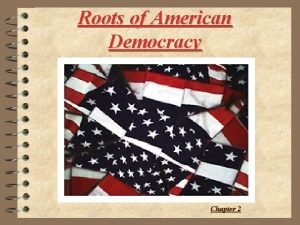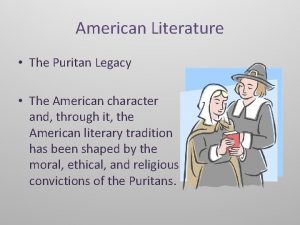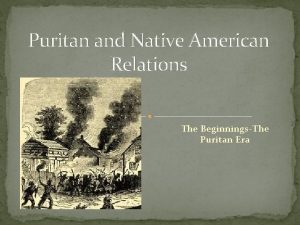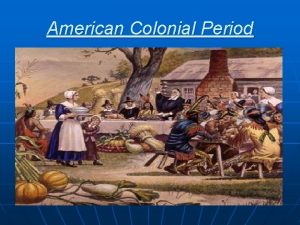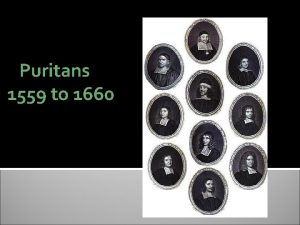AMERICAN LITERATURES COLONIAL ROOTS THE PURITAN LEGACY 2003


















- Slides: 18

AMERICAN LITERATURE’S COLONIAL ROOTS THE PURITAN LEGACY

© 2003 -2004 clipart. com REMEMBER THE PILGRIMS?

PILGRIMS AND PURITANS • The Pilgrims were part of a group of English Puritans called the “Separatists” who fled persecution (including torture and execution) in England. • The Pilgrims traveled to America aboard the Mayflower and landed at Plymouth in 1620. • Puritans is a general term for English Protestants who wanted to “purify” the Church of England. • The Puritans objected to the rituals, decorations, and organization of the Church of England. They wanted a simpler form of worship and organization.

A PURITAN TIME LINE In England 1608: Separatists flee England for Holland 1642– 1651: English civil wars between Puritans and Royalists 1653– 1658: Puritan Oliver Cromwell rules England as lord protector 1660: Monarchy restored under Charles II 1600 1700 1620: Mayflower Pilgrims land at Plymouth In America 1630: Great migration of Puritans to New England begins 1692: Salem witch trials

WHAT THE PURITANS BELIEVED • Religion is a personal, inner experience. • Humans are wicked by nature, and most are marked for damnation. • A chosen few can be saved through the grace of God. • Hard work and worldly success are signs of God’s grace. • Education is essential in order to read the Word of God. • To be a member of Puritan society, one had to join in debate and discussion about scripture • Parents concerned about souls of children would teach youngsters to read and write

GRACE: THE PURITAN IDEAL • Grace—God’s special favor—was the only way to escape an eternity in Hell. • People did not know for certain if they had grace, but they could feel the arrival of grace as an intense emotion. • People who had grace were among the “elect” (saved). • People who did not have grace were among the “unregenerate” (damned).

GRACE: THE PURITAN IDEAL • The presence of grace was demonstrated by a person’s outward behavior. People with grace displayed • self-reliance • personal responsibility • industriousness • temperance • simplicity

VALUES – SELF-RELIANCE AND INDUSTRIOUSNESS • Useful because the Puritans in New England had to • • • Build farms and establish towns in the wilderness Find their own food and shelter Make clothes and tools Figure out how to survive in a new world Deal with a new climate

Puritan Government In Theory • Every individual had an equal covenant with God. • Laws came from God, as revealed in scripture. In Practice • Most people yielded authority to those seen as the saintly “elect. ” • Conformity and obedience took precedence over individual rights.

WHY KINGS GRANTED CHARTERS • By allowing Puritans to move to America, the British Crown could establish English presence in the New World • Would also remove political troublemakers from England

Puritan Literature What the Puritans Read • The Bible and other religious texts Why They Read • Puritans stressed individual responsibility for spiritual development. • Every person was responsible for reading and understanding the Bible.

Puritan Literature What the Puritans Wrote • Sermons, essays, and poems on spiritual and religious subjects • Diaries and histories that recorded inner and outer events of their lives Why They Wrote • Puritans used writing to explore their lives for signs of grace and to describe the workings of God in their communities.

PLAIN STYLE • Puritans favored a plain style of writing. Plain style is a way of writing that stresses simplicity and clarity of expression. Plain style • emphasizes uncomplicated sentences and the use of everyday words from common speech • avoids elaborate figures of speech and imagery

WHY WITCHCRAFT? • Theology held that Satan was constantly scheming to seduce mankind into evil • Humans were wicked by nature • Grace could only be recognized by interpreting signs • Constantly scrutinizing oneself and one’s neighbor • Without science or modern medicine, unknown symptoms couldn’t be explain • Would lead to hysteria and fear

SALEM: BELIEVERS RUN AMOK • 1692—Girls suffer from mysterious illness in Salem, Massachusetts. • Doctors blame witchcraft. • Mass hysteria erupts; neighbors accuse one another. • In the end, about 150 people were accused, and 20 were executed.

WHAT HAPPENED TO THE PURITANS? • The Age of Faith gradually gave way to the Age of Reason. • Philosophers and scientists stressed the importance of using reason, rather than religion, to explain how the world operates. • The Puritans didn’t disappear—their culture was absorbed into the colonial mainstream.

THE PURITAN LEGACY • In the United States, we generally value • • individual rights and responsibilities equality of individuals literacy and education spiritual and worldly rewards for hard work

PURITANISM AND AMERICAN CULTURE • Still value • • • individual rights industriousness equality access to public education system strong work ethic
 Economic roots of american imperialism
Economic roots of american imperialism What jiggles like slow tambourine
What jiggles like slow tambourine Rishikim literature
Rishikim literature Colonial roots of the founding ideals answers
Colonial roots of the founding ideals answers Roots of a quadratic equation
Roots of a quadratic equation Biology roots vanessa jason
Biology roots vanessa jason List of cube numbers
List of cube numbers Perfect square definition
Perfect square definition Lesson 3 existence and uniqueness
Lesson 3 existence and uniqueness Who is this
Who is this Colonial literary period
Colonial literary period American literature colonial period
American literature colonial period Chapter 2 roots of american democracy answers
Chapter 2 roots of american democracy answers Roots of american imperialism
Roots of american imperialism Chapter 2 roots of american democracy answers
Chapter 2 roots of american democracy answers Lời thề hippocrates
Lời thề hippocrates Vẽ hình chiếu đứng bằng cạnh của vật thể
Vẽ hình chiếu đứng bằng cạnh của vật thể độ dài liên kết
độ dài liên kết Quá trình desamine hóa có thể tạo ra
Quá trình desamine hóa có thể tạo ra




